新编英语教程5课文翻译(unit9)
全新版大学英语综合教程5 unit1 课后答案

1.(1) allot
(2) go through fire and water
(3) reside
(4) sobbed
(5) made no mention of
(6) sacrifice
(7) came upon
(8) rhythm
2. She had thought that books were natural wonders, coming up of themselves like grass. So it was "startling and disappointing" for her to find out that story books had been, contrary to her expectations, written by people.
(8) Answer: an old Ford
P24 cloze
(1) Answer: go through fire and water
(2) Answer: salary
(3) Answer: give
(4) Answer: no peace
(5) Answer: sink into
(7) inward
5. (1) Answer: have come upon / across
(2) Answer: had come out
(3) Answer: come on / up
(4) Answer: came across
(5) Answer: comes down to
7. The book was completely worn out - it was lacking its front cover, the back held on by strips of pasted paper, and the pages stained; its illustrations had come unattached. Welty's father had lost his mother when he was seven, and this book was the only book he as a little boy had had of his own. Although he had never made any mention to his own children of the book, he had brought it along with him from Ohio to their house and shelved it in their bookcase.
新编英语教程5课文翻译unit115
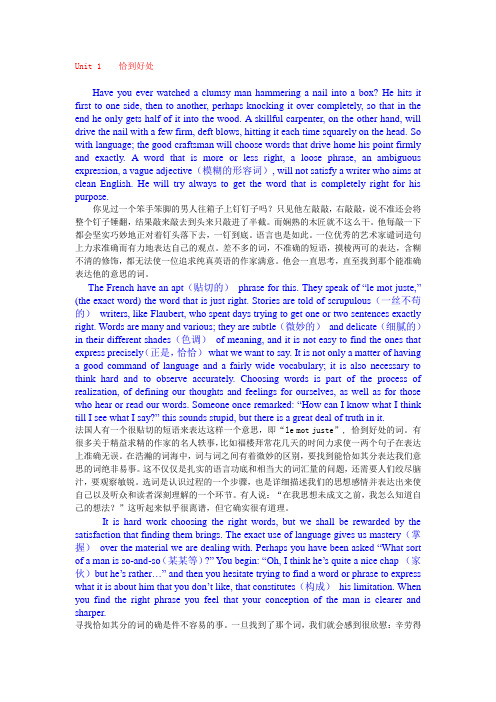
Unit 1 恰到好处Have you ever watched a clumsy man hammering a nail into a box? He hits it first to one side, then to another, perhaps knocking it over completely, so that in the end he only gets half of it into the wood. A skillful carpenter, on the other hand, will drive the nail with a few firm, deft blows, hitting it each time squarely on the head. So with language; the good craftsman will choose words that drive home his point firmly and exactly. A word that is more or less right, a loose phrase, an ambiguous expression, a vague adjective(模糊的形容词), will not satisfy a writer who aims at clean English. He will try always to get the word that is completely right for his purpose.你见过一个笨手笨脚的男人往箱子上钉钉子吗?只见他左敲敲,右敲敲,说不准还会将整个钉子锤翻,结果敲来敲去到头来只敲进了半截。
而娴熟的木匠就不这么干。
他每敲一下都会坚实巧妙地正对着钉头落下去,一钉到底。
语言也是如此。
一位优秀的艺术家谴词造句上力求准确而有力地表达自己的观点。
新编英语教程5Unit1-8课文及译文参考
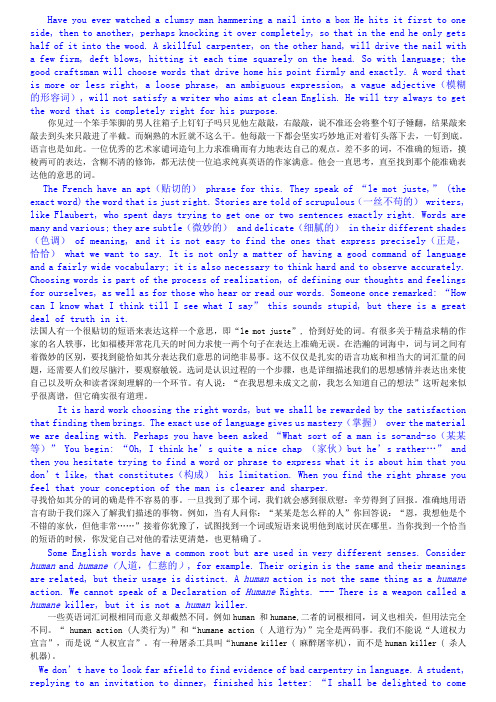
Have you ever watched a clumsy man hammering a nail into a box He hits it first to one side, then to another, perhaps knocking it over completely, so that in the end he only gets half of it into the wood. A skillful carpenter, on the other hand, will drive the nail with a few firm, deft blows, hitting it each time squarely on the head. So with language; the good craftsman will choose words that drive home his point firmly and exactly. A word that is more or less right, a loose phrase, an ambiguous expression, a vague adjective(模糊的形容词), will not satisfy a writer who aims at clean English. He will try always to get the word that is completely right for his purpose.你见过一个笨手笨脚的男人往箱子上钉钉子吗只见他左敲敲,右敲敲,说不准还会将整个钉子锤翻,结果敲来敲去到头来只敲进了半截。
而娴熟的木匠就不这么干。
他每敲一下都会坚实巧妙地正对着钉头落下去,一钉到底。
语言也是如此。
一位优秀的艺术家谴词造句上力求准确而有力地表达自己的观点。
差不多的词,不准确的短语,摸棱两可的表达,含糊不清的修饰,都无法使一位追求纯真英语的作家满意。
李观仪《新编英语教程(5)》(第3版)学习指南【词汇短语+课文精解+全文翻译+练习答案】

李观仪《新编英语教程(5)》(第3版)学习指南【词汇短语+课文精解+全文翻译+练习答案】目录Unit 1 一、词汇短语 二、参考译文 三、课文注释 四、练习答案Unit 2 一、词汇短语 二、参考译文 三、课文注释 四、练习答案Unit 3 一、词汇短语 二、参考译文 三、课文注释 四、练习答案Unit 4 一、词汇短语 二、参考译文 三、课文注释 四、练习答案Unit 5 一、词汇短语 二、参考译文 三、课文注释 四、练习答案Unit 6 一、词汇短语 二、参考译文 三、课文注释 四、练习答案Unit 7 一、词汇短语 二、参考译文 三、课文注释 四、练习答案Unit 8 一、词汇短语 二、参考译文 三、课文注释 四、练习答案Unit 9 一、词汇短语 二、参考译文 三、课文注释 四、练习答案Unit 10 一、词汇短语 二、参考译文 三、课文注释 四、练习答案Unit 11 一、词汇短语 二、参考译文 三、课文注释 四、练习答案Unit 12 一、词汇短语 二、参考译文 三、课文注释 四、练习答案弘博学习网————各类考试资料全收录内容简介《新编英语教程(第3版)学习指南》按照原教材的课次进行编写,每单元涉及单元语法、词汇短语、参考译文、课文精解以及练习答案等内容,旨在帮助学生更好、更高效地学习和掌握教材中的重点及难点知识,具有很强的针对性和实用性。
在编写过程中,该书力求突出重点,答疑难点,语言言简意赅,讲解深入浅出,希望它能得到广大英语专业学生和英语自学者的喜爱和认可。
弘博学习网————各类考试资料全收录Unit 1一、词汇短语Text I1clumsy [5klQmzi] adj. moving or doing things in a very awkward way 笨拙的,拙劣的:I spilt your coffee. Sorry—that was clumsy of me.我把你的咖啡弄洒了。
新编英语教程5课文翻译(unit1~15)
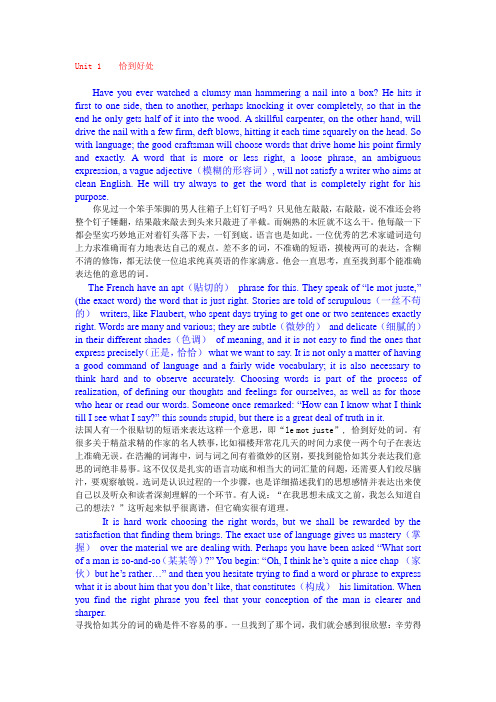
Unit 1 恰到好处Have you ever watched a clumsy man hammering a nail into a box? He hits it first to one side, then to another, perhaps knocking it over completely, so that in the end he only gets half of it into the wood. A skillful carpenter, on the other hand, will drive the nail with a few firm, deft blows, hitting it each time squarely on the head. So with language; the good craftsman will choose words that drive home his point firmly and exactly. A word that is more or less right, a loose phrase, an ambiguous expression, a vague adjective(模糊的形容词), will not satisfy a writer who aims at clean English. He will try always to get the word that is completely right for his purpose.你见过一个笨手笨脚的男人往箱子上钉钉子吗?只见他左敲敲,右敲敲,说不准还会将整个钉子锤翻,结果敲来敲去到头来只敲进了半截。
而娴熟的木匠就不这么干。
他每敲一下都会坚实巧妙地正对着钉头落下去,一钉到底。
语言也是如此。
一位优秀的艺术家谴词造句上力求准确而有力地表达自己的观点。
(完整word版)新编英语教程5(1-12)课文翻译.docx
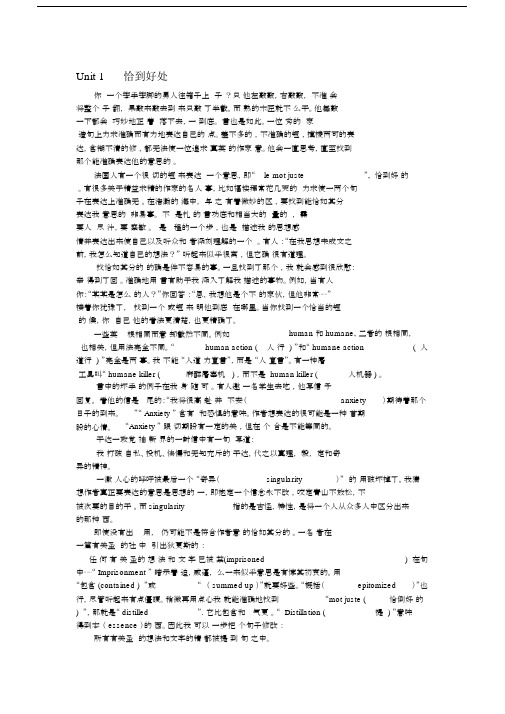
Unit 1恰到好处你一个笨手笨脚的男人往箱子上子?只他左敲敲,右敲敲,不准会将整个子翻,果敲来敲去到来只敲了半截。
而熟的木匠就不么干。
他每敲一下都会巧妙地正着落下去,一到底。
言也是如此。
一位秀的家造句上力求准确而有力地表达自己的点。
差不多的,不准确的短,摸棱两可的表达,含糊不清的修,都无法使一位追求真英的作家意。
他会一直思考,直至找到那个能准确表达他的意思的。
法国人有一个很切的短来表达一个意思,即“ le mot juste”, 恰到好的。
有很多关于精益求精的作家的名人事,比如福楼拜常花几天的力求使一两个句子在表达上准确无。
在浩瀚的海中,与之有着微妙的区,要找到能恰如其分表达我意思的非易事。
不是扎的言功底和相当大的量的,需要人尽汁,要察敏。
是程的一个步,也是描述我的思想感情并表达出来使自己以及听众和者深刻理解的一个。
有人:“在我思想未成文之前,我怎么知道自己的想法?” 听起来似乎很离,但它确很有道理。
找恰如其分的的确是件不容易的事。
一旦找到了那个,我就会感到很欣慰:辛得到了回。
准确地用言有助于我深入了解我描述的事物。
例如,当有人你:“某某是怎么的人?”你回答:“恩,我想他是个不的家伙,但他非常⋯⋯”接着你犹豫了,找到一个或短来明他到底在哪里。
当你找到一个恰当的短的候,你自己他的看法更清楚,也更精确了。
一些英根相同而意却截然不同。
例如human 和 humane, 二者的根相同,也相关,但用法完全不同。
“human action (人行 ) ”和“ humane action( 人道行 ) ”完全是两事。
我不能“人道力宣言”,而是“人宣言”。
有一种屠工具叫“ humane killer (麻醉屠宰机 ) ,而不是 human killer (人机器 ) 。
言中的坏手的例子在我身随可。
有人邀一名学生去吃,他写信予回复。
看他的信是尾的:“我将很高赴并不安(anxiety)期待着那个日子的到来。
”“ Anxiety ”含有和恐惧的意味。
李观仪《新编英语教程》学习指南【词汇短语+课文精解+全文翻译+练习答案】(Unit9)
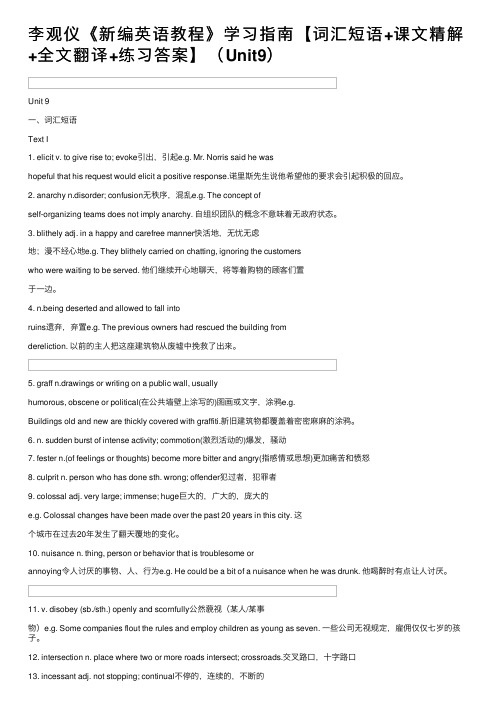
李观仪《新编英语教程》学习指南【词汇短语+课⽂精解+全⽂翻译+练习答案】(Unit9)Unit 9⼀、词汇短语Text I1. elicit v. to give rise to; evoke引出,引起e.g. Mr. Norris said he washopeful that his request would elicit a positive response.诺⾥斯先⽣说他希望他的要求会引起积极的回应。
2. anarchy n.disorder; confusion⽆秩序,混乱e.g. The concept ofself-organizing teams does not imply anarchy. ⾃组织团队的概念不意味着⽆政府状态。
3. blithely adj. in a happy and carefree manner快活地,⽆忧⽆虑地;漫不经⼼地e.g. They blithely carried on chatting, ignoring the customerswho were waiting to be served. 他们继续开⼼地聊天,将等着购物的顾客们置于⼀边。
4. n.being deserted and allowed to fall intoruins遗弃,弃置e.g. The previous owners had rescued the building fromdereliction. 以前的主⼈把这座建筑物从废墟中挽救了出来。
5. graff n.drawings or writing on a public wall, usuallyhumorous, obscene or political(在公共墙壁上涂写的)图画或⽂字,涂鸦e.g.Buildings old and new are thickly covered with graffiti.新旧建筑物都覆盖着密密⿇⿇的涂鸦。
新编英语教程5(词汇Unit1-10)
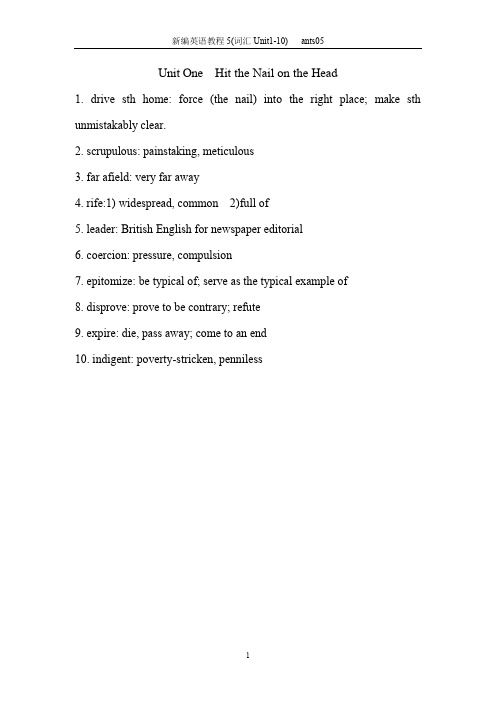
Unit One Hit the Nail on the Head1. drive sth home: force (the nail) into the right place; make sth unmistakably clear.2. scrupulous: painstaking, meticulous3. far afield: very far away4. rife:1) widespread, common 2)full of5. leader: British English for newspaper editorial6. coercion: pressure, compulsion7. epitomize: be typical of; serve as the typical example of8. disprove: prove to be contrary; refute9. expire: die, pass away; come to an end10. indigent: poverty-stricken, pennilessUnit Two Beware the dirty seas1. sluice: (v.) to pour as if from a sluice(水闸),i.e., a man-made passage for water fitted with a gate for stopping and regulating the flow; (n.) a channel controlling water flow2. nurture: further the development of; care for3. evolve: develop gradually (by a long continuous process)4. endemic: (of a disease) found regularly in a particular place5. litany: repetition. The literal meaning of “litany” is “a prayer consisting of a series of invocations and supplications by the leader with responses by the congregation”.6. flush: pour; flood with water to clean out (See dictionary)7. lurk: exist unseen8. effluent: liquid wastes, such as chemicals or sewage that flows out from a factory or some other places into a river or the sea9. plankton: very small forms of plant and animal life that live in a body off water 浮游生物10. slime: unpleasant sticky substance, such as the thick sticky liquid on the skin of various fishUnit Three My Friend, Albert Einstein1. knack: a clever way of doing things2. be in awe of: have respect as well as fear and reverence for3. staggering: unexpectedly surprising; astounding4. vestiges: traces5. ultimately: finally; after a long series of time6. recalcitrant: hard to deal with; unmanageable7. worry: assail a problem again and again until it is solved, just like a dog biting some small animals repeatedly, shaking it or pulling it with the teeth8. surcease: (archaic) cessation, pause9. plausible: seeming to be reasonable10. a house of cards: an insecure scheme11. ineffable: unutterable; incapable of being expressed in words12. elusively whimsical: indescribably quaint or strange 捉摸不透的,古怪Unit Four The Invisible Poor1. perennial: lasting forever or for a long time2. rutted roads: roads with deep, narrow marks made by the wheels of vehicles3. be exempt from: be freed from a duty. service, payment, etc.4. tenement: a large building, especially one in the poor part of a city, which is divided into small flats which are rented cheaply5. affluent: wealthy, prosperous6. compound v.: /kom'paund/ make worse by adding (something) to . . . (often used in the passive)7. existential: relating to human experience (a formal-word)8. lurid: sensational, shocking9. dispossessed: people who have lost all their possessions10. cynical: doubtful as to whether something will happen or whether it is worthwhile11. involvement: connection12. old rhetoric of reform: writings about reform in the past that sounded fine and important, but were really insincere and meaninglessUnit Five The Plug—in Drug:TV and the American Family,PartⅠ1. afflict: trouble2. asset: valuable object; advantage3. preposterous: unthinkable, absurd4. splintering: splitting, breaking up5. the peer group: a group of people of the same age, class, position. etc. here, group of children of the same age6. television-oriented: interested in and influenced by TV7. equivocal: ambiguous8. sorcerer: person who performs magic by using the power of evil spirits9. stint: fixed amount of work: here, the fixed TV programme10. conjure up: bring into the mind11. sane: (in this context) in possession of good relations/of a close bond12. backlog: a reserveUnit Six Preparing for College1. driving motive: the incentive / encouragement that urges them on;2. the rudiments: the basics, the fundamentals (The word rudiments is always in the plural form when used in this sense.)3. metaphysics: the branch of philosophy that deals with abstract concepts, etc. 形而上学,玄学,纯粹哲学4. conscious culture: the culture (i.e. customs, arts, etc,) that is directly perceptible or known to us5. fanatic: one who is very enthusiastic about a particular activity6. personify: express or represent ( a quality in human form)7. sedentary: inactive; done while sitting down8. underline: indicate the importance of9. balked: baffled; frustrated10. a maddening lot: a wild, uncontrollable group11. righteous sects: morally justifiable groups of people whose religious beliefs are considered different form those of a larger group12. relish: 味,味道,兴趣;开胃小菜;great enjoymentUnit Seven Grouping the Gifted:Pro1. innate: belonging to an individual from birth2. pursuit: an activity that one engages in as a profession, vocation, or avocation3. athlete: person who practises athletics; competitor or skilled performer in physical exercises4. heterogeneously: in such a way that members are very different from one another5. criterion /--ia: standard on which a decision may be based6. snob: one who has an offensive air of superiority (here, in matters of knowledge)7. elite: a socially superior group8. instill: put (ideas, etc. ) gradually but firmly into someone's mind by continuous effort9. spark: encourage; stimulate into greater activity10. latent: present and capable of becoming though not now visible or active11. skyrocket: rise or increase rapidly12. pay dividends: produce an advantage. especially as a result of an earlier action (dividend: that part of the money made by a business which is divided among those who own shares in the business 红利)Unit Eight Why Nothing Works1. savant: a man of learning, especially a person with detailed knowledge in some specialized field2. corollary: an immediate inference from a proved proposition3. forestall: defeat, prevent by prior measures4. commitment: a pledge to follow certain beliefs or a certain course of action; devotion (to duty etc. )5. artifact: a usually small object (as a tool or an ornament) showing human workmanship that has special historical interest6. evoke: bring to mind7. projectile point: the tip of a weapon that is thrust forward; spear or arrowhead8. band: a group of people formed for some common purpose and often with a leader9. barter: trade by exchanging one commodity for another10. alienation: a withdrawing or separation of a person from an object or position of former attachment; a feeling of not belonging to or being part of one's surroundingsUnit Nine Where Is the News Leading Us?1. symposium: a conference in which experts or scholars discuss a certain subject2. scrutinize: examine very closely and carefully3. distortion: misrepresentation; a false or dishonest account4. eruptive: (in this context) sensational, shocking, disturbing5. collide with: crash violently into; run into (one another)6. ingredient: a component part of something7. inhibitor: one who holds back, prevents8. deplete: exhaust, use up, reduce9. cynicism: disbelief in the sincerity of human motives10. antidote: remedy, corrective; something that prevents or counteracts11. envision: picture mentally, imagine, visualize12. caricature: a picture ludicrously滑稽的exaggerating the peculiarities or defects of persons or thingsUnit Ten Things:The Throw—Away Society1. Humanoid: having human form or characteristics2. texture: the degree of roughness or smoothness, coarseness or fineness, of a substance or material, especially as felt by touch; visual and tactile qualities of a surface3. staggering: stunning, wondrous, breathtaking4. deride: laugh at contemptuously; to scoff at or mock5. transience: temporariness, impermanence; the quality or state of being temporary or impermanent6. at a rapid clip: (informal) at a fast pace7. inextricably embedded: so deeply involved that it is impossible to get free8. boutique: a small fashionable clothes shop9. sumptuous: expensive and grand10. train: a part of a long dress that spreads over the ground behind the wearer11. A-line dresses: dresses with a flared bottom and close-fitting top, having an "A" or tent-like shape12. supplant: take the place of; replace。
新编英语教程unit1,2,3,4,5,8,9,10,11 课文翻译
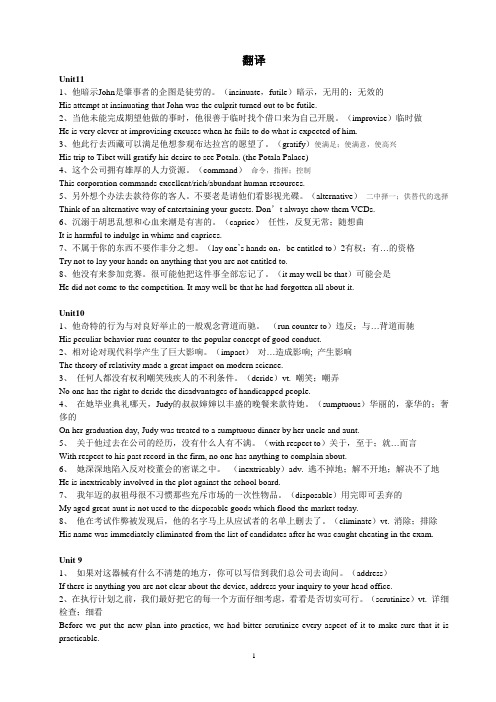
翻译Unit111、他暗示John是肇事者的企图是徒劳的。
(insinuate,futile)暗示,无用的;无效的His attempt at insinuating that John was the culprit turned out to be futile.2、当他未能完成期望他做的事时,他很善于临时找个借口来为自己开脱。
(improvise)临时做He is very clever at improvising excuses when he fails to do what is expected of him.3、他此行去西藏可以满足他想参观布达拉宫的愿望了。
(gratify)使满足;使满意,使高兴His trip to Tibet will gratify his desire to see Potala. (the Potala Palace)4、这个公司拥有雄厚的人力资源。
(command)命令,指挥;控制This corporation commands excellent/rich/abundant human resources.5、另外想个办法去款待你的客人。
不要老是请他们看影视光碟。
(alternative)二中择一;供替代的选择Think of an alternative way of entertaining your guests. Don’t always show them VCDs.6、沉溺于胡思乱想和心血来潮是有害的。
(caprice)任性,反复无常;随想曲It is harmful to indulge in whims and caprices.7、不属于你的东西不要作非分之想。
(lay one’s hands on,be entitled to)2有权;有…的资格Try not to lay your hands on anything that you are not entitled to.8、他没有来参加竞赛。
新编英语教程5 Unit 9 Where Is the News Leading Us教学文案
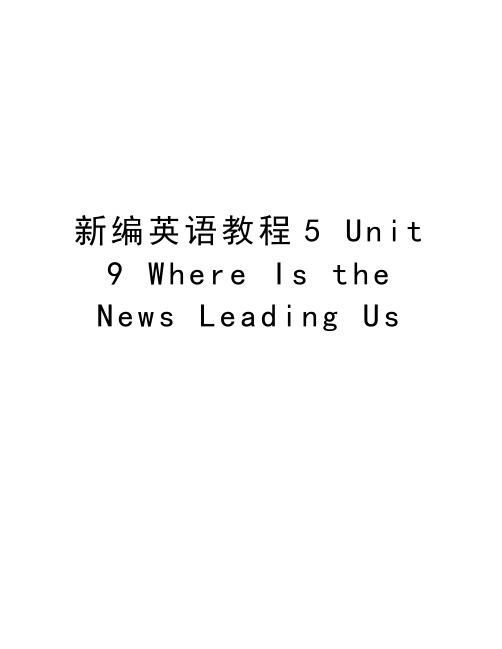
新编英语教程5U n i t 9W h e r e I s t h eN e w s L e a d i n g U sUnit NINE: TEXT IWords and Expressions1)symposium (l. 1)n. a conference in which experts or scholars discuss a certain subject座谈会;学术报告会;专题讨论会2)to the core (l. 3)through and through; completely 货真价实;反复;彻头彻尾e.g. rotten to the core 透心腐烂;糟糕透顶unrelieved (l. 35): utter; complete 完全的;彻头彻尾的;完完全全的:unrelieved boredom 完全的厌倦3)ways and means (l. 2) n. (a set phrase) 方式;方法;手段e.g. There are several ways and means of approaching this problem.对于这个问题有好几种处理办法。
4)scrutinize (l. 5)vt. examine very closely and carefullyn. scrutiny (l. 44)e.g. His proposal to improve public transportation is under close scrutiny.5)disaster-prone (l. 9)tending to report disasters; interested in reporting disastersprone: adj. likely to suffer from an illness; tending to show a particular negative characteristic.e.g. be prone to err 易犯过失 be prone to think that 总认为She is prone to anger / exaggeration / flu.Syn: be likely to do; be inclined to do; be apt to do; be liable to doProne may also be used after a noun with a hyphen combining the two,e. g., accident-prone (often having accidents), injury-prone (oftengetting injuries)6)distortion (l. 15)n. a false or dishonest account; a statement that twists fact; amisrepresentation歪曲;曲解7)apt (l. 22)be apt to do: be likely to do辨析:apt, liable; pronea) apt 是常用词, 尤其是用在口语中, 表示“有...倾向的”、“易于...的”, 如:He is apt to get excited over trifles. 他容易为小事而激动。
Unit3Lying全新版大学英语综合教程五课文翻译
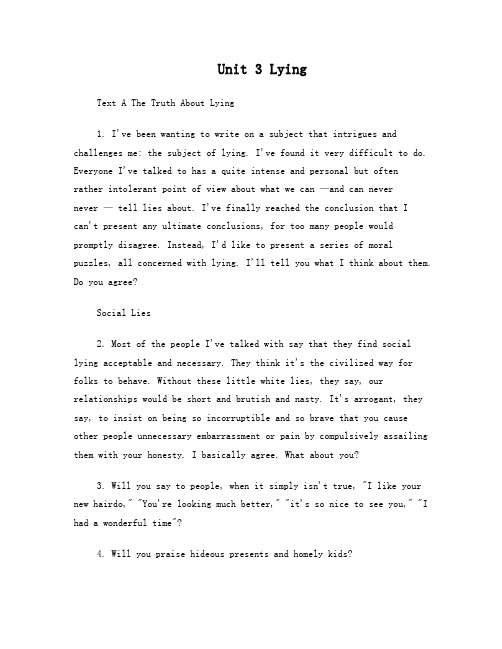
Unit 3 LyingText A The Truth About Lying1. I've been wanting to write on a subject that intrigues and challenges me: the subject of lying. I've found it very difficult to do. Everyone I've talked to has a quite intense and personal but oftenrather intolerant point of view about what we can —and can nevernever — tell lies about. I've finally reached the conclusion that Ican't present any ultimate conclusions, for too many people would promptly disagree. Instead, I'd like to present a series of moral puzzles, all concerned with lying. I'll tell you what I think about them. Do you agree?Social Lies2. Most of the people I've talked with say that they find social lying acceptable and necessary. They think it's the civilized way for folks to behave. Without these little white lies, they say, our relationships would be short and brutish and nasty. It's arrogant, they say, to insist on being so incorruptible and so brave that you cause other people unnecessary embarrassment or pain by compulsively assailing them with your honesty. I basically agree. What about you?3. Will you say to people, when it simply isn't true, "I like your new hairdo," "You're looking much better," "it's so nice to see you," "I had a wonderful time"?4. Will you praise hideous presents and homely kids?5. Will you decline invitations with "We're busy that night — so sorry we can't come," when the truth is you'd rather stay home than dine with the So-and-sos?6. And even though, as I do, you may prefer the polite evasion of "You really cooked up a storm "instead of "The soup" —which tastes like warmed-over coffee —"is wonderful," will you, if you must, proclaim it wonderful?7. There's one man I know who absolutely refuses to tell social lies. "I can't play that game," he says; "I'm simply not made that way." And his answer to the argument that saying nice things to someonedoesn't cost anything is, "Yes, it does — it destroys your credibility." Now, he won't, unsolicited, offer his views on thepainting you just bought, but you don't ask his frank opinion unless you want frank, and his silence at those moments when the rest of us liars are muttering, "Isn't it lovely?" is, for the most part, eloquent enough. My friend does not indulge in what he calls "flattery, false praise and mellifluous comments." When others tell fibs he will not go along. He says that social lying is lying, that little white lies are still lies. And he feels that telling lies is morally wrong. What about you?Peace-Keeping Lies8. Many people tell peace-keeping lies: lies designed to avoid irritation or argument, lies designed to shelter the liar from possible blame or pain; lies (or so it is rationalized) designed to keep trouble at bay without hurting anyone.9. I tell these lies at times, and yet I always feel they're wrong.I understand why we tell them, but still they feel wrong. And whenever I lie so that someone won't disapprove of me or think less of me or holler at me, I feel I'm a bit of a coward, I feel I'm dodging responsibility, I feel...guilty. What about you?10. Do you, when you're late for a date because you overslept, say that you're late because you got caught in a traffic jam?11. Do you, when you forget to call a friend, say that you called several times but the line was busy?12. Do you, when you didn't remember that it was your father's birthday, say that his present must be delayed in the mail?13. And when you're planning a weekend in New York City and you're not in the mood to visit your mother, who lives there, do you conceal —with a lie, if you must — the fact that you'll be in New York? Or do you have the courage — or is it the cruelty? — to say, "I'll be in New York, but sorry — I don't plan on seeing you"?14. (Dave and his wife Elaine have two quite different points of view on this very subject. He calls her a coward. She says she's being wise. He says she must assert her right to visit New York sometimes and not see her mother. To which she always patiently replies: "Why should we have useless fights? My mother's too old to change. We get along much better when I lie to her.")15. Finally, do you keep the peace by telling your husband lies on the subject of money? Do you reduce what you really paid for your shoes?And in general do you find yourself ready, willing and able to lie to him when you make absurd mistakes or lose or break things?16. "I used to have a romantic idea that part of intimacy was confessing every dumb thing that you did to your husband. But after a couple of years of that," says Laura, "haveI changed my mind!"17. And having changed her mind, she finds herself telling peacekeeping lies. And yes, I tell them too. What about you?Protective Lies18. Protective lies are lies folks tell —often quite seriouslies —because they're convinced that the truth would be too damaging. They lie because they feel there are certain human values that supersede the wrong of having lied. They lie, not for personalgain, but because they believe it's for the good of the personthey're lying to. They lie to those they love, to those who trust them most of all, on the grounds that breaking this trust is justified.19. They may lie to their children on money or marital matters.20. They may lie to the dying about the state of their health.21. They may lie to their closest friend because the truth about her talents or son or psyche would be — or so they insist — utterly devastating.22. I sometimes tell such lies, but I'm aware that it's quite presumptuous to claim I know what's best for others to know. That's called playing God . That's called manipulation and control. And wenever can be sure, once we start to juggle lies, just where they'll land, exactly where they'll roll.23. And furthermore, we may find ourselves lying in order to backup the lies that are backing up the lie we initially told.24. And furthermore —let's be honest —if conditions were reversed, we certainly wouldn't want anyone lying to us.25. Yet, having said all that, I still believe that there are times when protective lies must nonetheless be told. What about you?Trust-Keeping Lies26. Another group of lies are trust-keeping lies, lies that involve triangulation, with A (that's you) telling lies to B on behalf of C (whose trust you'd promised to keep). Most people concede that onceyou've agreed not to betray a friend's confidence, you can't betray it, even if you must lie. But I've talked with people who don't want you telling them anything that they might be called on to lie about.27. "I don't tell lies for myself," says Fran, "and I don't want to have to tell them for other people." Which means, she agrees, that ifher best friend is having an affair, she absolutely doesn't want to know about it.28. "Are you saying," her best friend asks, "that you'd betray me?"29. Fran is very pained but very adamant. "I wouldn't want to betray you, so…don't tell me anything about it."30. Fran's best friend is shocked. What about you?31. Do you believe you can have close friends if you're not prepared to receive their deepest secrets?32. Do you believe you must always lie for your friends?33. Do you believe, if your friend tells a secret that turns out to be quite immoral or illegal, that once you've promised to keep it, you must keep it?34. And what if your friend were your boss — if you were perhaps one of the President's men — would you betray or lie for him over, say, Watergate?35. As you can see, these issues get terribly sticky.36. It's my belief that once we've promised to keep a trust, we must tell lies to keep it. I also believe that we can't tell Watergate lies. And if these two statements strike you as quite contradictory,you're right —they're quite contradictory. But for now they're the best I can do. What about you?37. There are those who have no talent for lying.38. "Over the years, I tried to lie," a friend of mine explained, "but I always got found out and I always got punished. I guess I gavemyself away because I feel guilty about any kind of lying. It looks as if I'm stuck with telling the truth."39. For those of us, however, who are good at telling lies, for those of us who lie and don't get caught, the question of whether or not to lie can be a hard and serious moral problem. I liked the remark of a friend of mine who said, "I'm willing to lie. But just as a lastresort — the truth's always better."40. "Because," he explained, "though others may completely accept the lie I'm telling, I don't."41. I tend to feel that way too.42. What about you?关于说谎的真相朱迪斯·维奥斯特我一直想写一个令我深感兴趣的话题:关于说谎的问题。
新编英语教程5课文翻译(unit115)(学生必备)

Unit 1 hit the nail on the head 恰到好处Have you ever watche d a clumsy man hammer ing a nail into a box? He hits it firstto one side, then to anothe r, perhap s knocki ng it over compl e t ely,so that in the end he only gets half of it into the wood. A skill f u l carpen ter, on the otherhand, will drivethe nail with a few firm, deft blows,hittin g it each time square ly on the head. So with langua ge; the good crafts man will choose wordsthat drivehome his pointfirmly and exactl y. A word that is more or less right,a loosephrase, an ambigu ous expres sion,a vagueadject ive(模糊的形容词), will not satisf y a write r who aims at cleanEnglis h. He will try always to get the word that is comple telyrightfor his purpos e.你见过一个笨手笨脚的男人往箱子上钉钉子吗?只见他左敲敲,右敲敲,说不准还会将整个钉子锤翻,结果敲来敲去到头来只敲进了半截。
英语必修5课文翻译 (5)

英语必修5课文翻译第一课:I am an English Teacher原文:I am an English teacher. I teach English in a middle school. My students are from different classes. They are in Grade Seven. I love my students and my work. I often play games with them and sing songs with them. Sometimes, I play basketball with them, too.I have three classes in the morning. They are interesting and exciting. I enjoy my classes. I usually have lunch at 12:00. After lunch, I have a short rest, and then I read books in my office. I like reading books. I think books are my best friends.In the afternoon, I have two classes. After class, I help my students with their English. I enjoy helping them. I usually leave the school at 5:00 p.m.译文:我是一名英语老师。
我在一所中学教英语。
我的学生来自不同的班级,都在七年级。
我喜欢我的学生和我的工作。
我经常和他们一起玩游戏、唱歌。
有时候,我也和他们一起打篮球。
早上我有三节课。
它们非常有趣和令人兴奋。
我喜欢我的课程。
我通常在12点吃午饭。
(完整word版)高级英语新编英语教程5课文+翻译unit9

Unit 91 Not long ago I was asked to join in a public symposium on the role of the American press。
Two other speakers were included on the program. The first was a distinguished TV anchorman. The other was the editor of one of the nation’s leading papers,a newsman to the core –though , aggressive, and savvy in the ways and means of solid reporting。
不久前,我应邀参加了一次有关美国报业的作用的公共研讨会。
还有另外两位嘉宾也出席了,一位是知名的节目主持人,另一位是美国一家主要报纸的编辑,他勇敢坚定,咄咄逼人,深谙撰写可靠新闻的之道,堪称一位彻头彻尾的新闻界人士.2 The purpose of the symposium,as I understood it,was to scrutinize the obligations of the media and to suggest the best ways to meet those obligations。
据我所知,本次研讨会旨在审查传媒的使命,提出完成使命的最佳方式。
3 During the open—discussion period, a gentleman in the audience addressed a question to my two colleagues。
Why,he asked, are the newspapers and the television news programs so disaster-prone? Why are newsmen and women so attracted to tragedy, violence,failure?在公开讨论时,观众席中的一位男士向两位嘉宾提问,‘为什么报纸和电视新闻都充斥灾难?为什么新闻界的男男女女对悲剧、暴力和失败有如此关注?’4 The anchorman and editor reached as though they had been blamed for the existence of bad news。
全新版大学英语综合教程5课文翻译

全新版大学英语综合教程5课文翻译1Unit1 One Writer's Beginnings作家起步时1.我从两三岁起就知道,家中随便在哪个房间里,白天无论在什么时间,都可以念书或听人念书。
母亲念书给我听。
上午她都在那间大卧室里给我念,两人一起坐在她那把摇椅里,我们摇晃时,椅子发出有节奏的滴答声,好像有只唧唧鸣叫的蟋蟀在伴着读故事。
冬日午后,她常在餐厅里烧着煤炭的炉火前给我念,布谷鸟自鸣钟发出“咕咕”声时,故事便结束了;晚上我在自己床上睡下后她也给我念。
想必我是不让她有一刻清静。
有时她在厨房里一边坐着搅制黄油一边给我念,故事情节就随着搅制黄油发出的抽抽搭搭的声响不断展开。
我的奢望是她念我来搅拌;有一次她满足了我的愿望,可是我要听的故事她念完了,她要的黄油我却还没弄好。
她念起故事来富有表情。
比如,她念《穿靴子的猫》时,你就没法不相信她对猫一概怀疑。
2 当我得知故事书原来是人写出来的,书本原来不是什么大自然的奇迹,不像草那样自生自长时,真是又震惊又失望。
不过,姑且不论书本从何而来,我不记得自己有什么时候不爱书——书本本身、封面、装订、印着文字的书页,还有油墨味、那种沉甸甸的感觉,以及把书抱在怀里时那种将我征服、令我陶醉的感觉。
还没识字,我就想读书了,一心想读所有的书。
3 我的父母都不是来自那种买得起许多书的家庭。
然而,虽然买书准得花去他不少薪金,作为一家成立不久的保险公司最年轻的职员,父亲一直在精心挑选、不断订购他和母亲认为儿童成长应读的书。
他们购书首先是为了我们的前程。
4 除了客厅里有一向被称作“图书室”的书橱,餐厅的窗子下还有几张摆放百科全书的桌子和一个字典架。
这里有伴随我们在餐桌旁争论着长大的《韦氏大词典》、《哥伦比亚百科全书》、《康普顿插图百科全书》、《林肯资料文库》,以及后来的《知识库》。
“图书馆”书橱里的书没过多久我就能读了——我的确读了,全都读了,按着顺序,一排接着一排读,从最上面的书架一直读到最下面的书架。
李观仪新编英语教程第五册unit 9 where is the news leading us
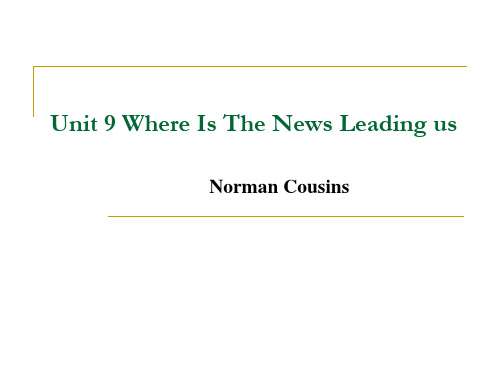
Dictionary work
3. distortion: the mistake of misrepresenting the facts; a false or dishonest account We know that the bitterness is a distortion, not a true reflection of what is in our hearts. cf: perversion, deformity, bend, twist, warp, malformation
About the Author
U.S.editor and author ,is one of the most influential magazine editors of the twentieth century . He was editor of the Saturday Review (星期六评论)from 1940 to 1971. He was a powerful advocate of world government .
Dictionary work
1. symposium: a meeting or conference for discussion of a topic, especially one in which the participants form an audience and make presentations Trans:他那时在参加一个有关人口的国际研讨会。 He had been taking part in an international symposium on population.
The Author’s Works
新编英语教程5 Unit Nine
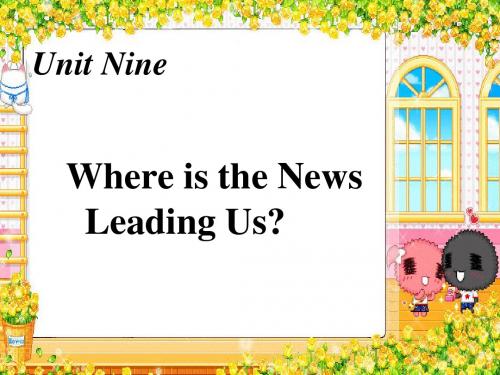
Paraphrase 2 The news media seem to…respond to daily events? The different ways of providing news seem all to follow the belief that all news is bad news. Why is this so? Could it be because people are used to put emphasis on negative news as a rule and because newsperson are generally sensitive to such news when facing everyday happenings?
Paraphrase 1 The other was the editor…solid reporting. The other was a complete newspaperman—uncompromising, energetic and knowledgeable about how to report reliable news based on facts.
Voc. 7 • ingredient: component, often used in cooking, • E.g.: Flour, eggs, sugar are the chief ingredients of any kind of cake.
• Voc. 8 • change for the better: an improvement. Better here is a noun. • E.g.: We hope his changed attitude towards work will bring him a change for the better. • Contrary to all expectations, his efforts resulted in a change for the worse.
新编英语教程5unit9whereisthenewsleadingus

新编英语教程5U n i t 9W h e r e I s t h eN e w s L e a d i n g U s -CAL-FENGHAI.-(YICAI)-Company One1Unit NINE: TEXT IWords and Expressions1)symposium (l. 1)n. a conference in which experts or scholars discuss a certain subject座谈会;学术报告会;专题讨论会2)to the core (l. 3)through and through; completely 货真价实;反复;彻头彻尾e.g. rotten to the core 透心腐烂;糟糕透顶unrelieved (l. 35): utter; complete 完全的;彻头彻尾的;完完全全的:unrelieved boredom 完全的厌倦3)ways and means (l. 2) n. (a set phrase) 方式;方法;手段e.g. There are several ways and means of approaching this problem.对于这个问题有好几种处理办法。
4)scrutinize (l. 5)vt. examine very closely and carefullyn. scrutiny (l. 44)e.g. His proposal to improve public transportation is under close scrutiny.5)disaster-prone (l. 9)tending to report disasters; interested in reporting disastersprone: adj. likely to suffer from an illness; tending to show a particular negative characteristic.e.g. be prone to err 易犯过失 be prone to think that 总认为She is prone to anger / exaggeration / flu.Syn: be likely to do; be inclined to do; be apt to do; be liable to doProne may also be used after a noun with a hyphen combining the two,e. g., accident-prone (often having accidents), injury-prone (oftengetting injuries)6)distortion (l. 15)n. a false or dishonest account; a statement that twists fact; amisrepresentation歪曲;曲解7)apt (l. 22)be apt to do: be likely to do辨析:apt, liable; pronea) apt 是常用词, 尤其是用在口语中, 表示“有...倾向的”、“易于...的”, 如:He is apt to get excited over trifles. 他容易为小事而激动。
新编英语教程5课文翻译
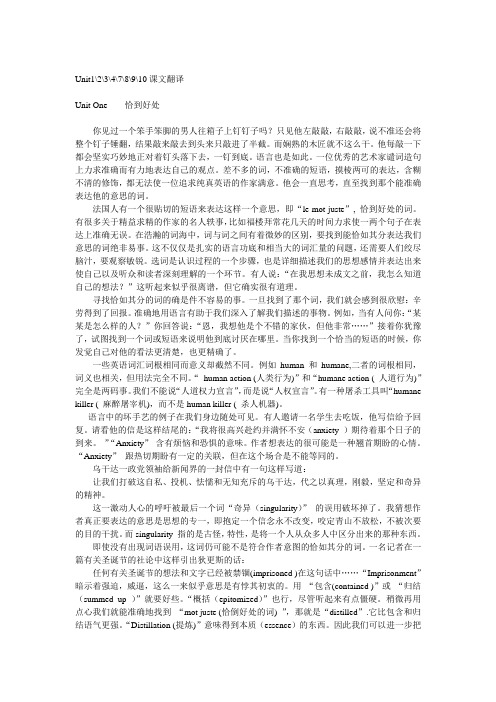
Unit1\2\3\4\7\8\9\10课文翻译Unit One 恰到好处你见过一个笨手笨脚的男人往箱子上钉钉子吗?只见他左敲敲,右敲敲,说不准还会将整个钉子锤翻,结果敲来敲去到头来只敲进了半截。
而娴熟的木匠就不这么干。
他每敲一下都会坚实巧妙地正对着钉头落下去,一钉到底。
语言也是如此。
一位优秀的艺术家谴词造句上力求准确而有力地表达自己的观点。
差不多的词,不准确的短语,摸棱两可的表达,含糊不清的修饰,都无法使一位追求纯真英语的作家满意。
他会一直思考,直至找到那个能准确表达他的意思的词。
法国人有一个很贴切的短语来表达这样一个意思,即“le mot juste”, 恰到好处的词。
有很多关于精益求精的作家的名人轶事,比如福楼拜常花几天的时间力求使一两个句子在表达上准确无误。
在浩瀚的词海中,词与词之间有着微妙的区别,要找到能恰如其分表达我们意思的词绝非易事。
这不仅仅是扎实的语言功底和相当大的词汇量的问题,还需要人们绞尽脑汁,要观察敏锐。
选词是认识过程的一个步骤,也是详细描述我们的思想感情并表达出来使自己以及听众和读者深刻理解的一个环节。
有人说:“在我思想未成文之前,我怎么知道自己的想法?”这听起来似乎很离谱,但它确实很有道理。
寻找恰如其分的词的确是件不容易的事。
一旦找到了那个词,我们就会感到很欣慰:辛劳得到了回报。
准确地用语言有助于我们深入了解我们描述的事物。
例如,当有人问你:“某某是怎么样的人?”你回答说:“恩,我想他是个不错的家伙,但他非常……”接着你犹豫了,试图找到一个词或短语来说明他到底讨厌在哪里。
当你找到一个恰当的短语的时候,你发觉自己对他的看法更清楚,也更精确了。
一些英语词汇词根相同而意义却截然不同。
例如human 和humane,二者的词根相同,词义也相关,但用法完全不同。
“human action (人类行为)”和“humane action ( 人道行为)”完全是两码事。
我们不能说“人道权力宣言”,而是说“人权宣言”。
新编英语教程5课文翻译(unit9)
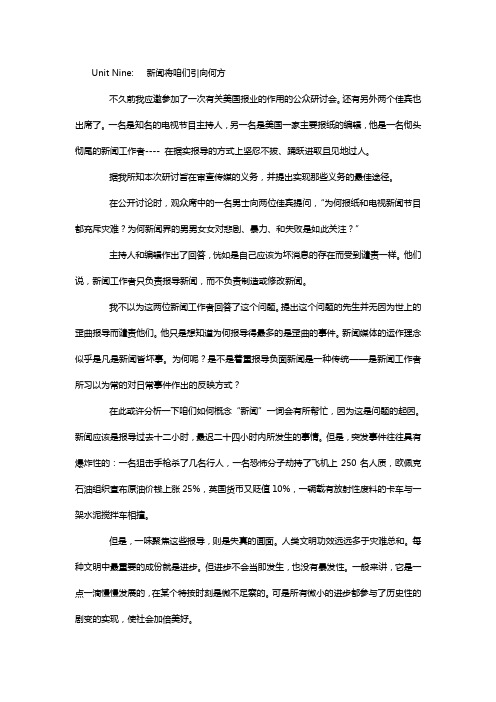
Unit Nine: 新闻将咱们引向何方不久前我应邀参加了一次有关美国报业的作用的公众研讨会。
还有另外两个佳宾也出席了。
一名是知名的电视节目主持人,另一名是美国一家主要报纸的编辑,他是一名彻头彻尾的新闻工作者---- 在据实报导的方式上坚忍不拔、踊跃进取且见地过人。
据我所知本次研讨旨在审查传媒的义务,并提出实现那些义务的最佳途径。
在公开讨论时,观众席中的一名男士向两位佳宾提问,“为何报纸和电视新闻节目都充斥灾难?为何新闻界的男男女女对悲剧、暴力、和失败是如此关注?”主持人和编辑作出了回答,恍如是自己应该为坏消息的存在而受到谴责一样。
他们说,新闻工作者只负责报导新闻,而不负责制造或修改新闻。
我不以为这两位新闻工作者回答了这个问题。
提出这个问题的先生并无因为世上的歪曲报导而谴责他们。
他只是想知道为何报导得最多的是歪曲的事件。
新闻媒体的运作理念似乎是凡是新闻皆坏事。
为何呢?是不是着重报导负面新闻是一种传统——是新闻工作者所习以为常的对日常事件作出的反映方式?在此或许分析一下咱们如何概念“新闻”一词会有所帮忙,因为这是问题的起因。
新闻应该是报导过去十二小时,最迟二十四小时内所发生的事情。
但是,突发事件往往具有爆炸性的:一名狙击手枪杀了几名行人,一名恐怖分子劫持了飞机上250名人质,欧佩克石油组织宣布原油价钱上涨25%,英国货币又贬值10%,一辆载有放射性废料的卡车与一架水泥搅拌车相撞。
但是,一味聚焦这些报导,则是失真的画面。
人类文明功效远远多于灾难总和。
每种文明中最重要的成份就是进步。
但进步不会当即发生,也没有暴发性。
一般来讲,它是一点一滴慢慢发展的,在某个特按时刻是微不足察的。
可是所有微小的进步都参与了历史性的剧变的实现,使社会加倍美好。
就是这种活生生的历史,绝大多数的新闻媒体没有予以充分的反映,结果致使咱们对社会的正面发展了解不足,对灾难却知之甚多,这又令人产生失败和失望的情绪,而这些情绪易于阻碍社会进步。
- 1、下载文档前请自行甄别文档内容的完整性,平台不提供额外的编辑、内容补充、找答案等附加服务。
- 2、"仅部分预览"的文档,不可在线预览部分如存在完整性等问题,可反馈申请退款(可完整预览的文档不适用该条件!)。
- 3、如文档侵犯您的权益,请联系客服反馈,我们会尽快为您处理(人工客服工作时间:9:00-18:30)。
Unit Nine: 新闻将我们引向何方
不久前我应邀参加了一次有关美国报业的作用的公众研讨会。
还有另外两个嘉宾也出席了。
一位是知名的电视节目主持人,另一位是美国一家主要报纸的编辑,他是一位彻头彻尾的新闻工作者---- 在据实报道的方式上坚忍不拔、积极进取且见识过人。
据我所知本次研讨旨在审查传媒的义务,并提出实现那些义务的最佳途径。
在公开讨论时,观众席中的一位男士向两位嘉宾提问,“为什么报纸和电视新闻节目都充斥灾难?为什么新闻界的男男女女对悲剧、暴力、和失败是如此关注?”
主持人和编辑作出了回答,好像是自己应该为坏消息的存在而受到谴责一样。
他们说,新闻工作者只负责报道新闻,而不负责制造或修改新闻。
我不认为这两位新闻工作者回答了这个问题。
提出这个问题的先生并没有因为世上的歪曲报道而谴责他们。
他只是想知道为什么报道得最多的是歪曲的事件。
新闻媒体的运作理念似乎是凡是新闻皆坏事。
为什么呢?是不是着重报道负面新闻是一种传统——是新闻工作者所习以为常的对日常事件作出的反应方式?
在此或许分析一下我们如何定义“新闻”一词会有所帮助,因为这是问题的起因。
新闻应该是报道过去十二小时,最迟二十四小时内所发生的事情。
然而,突发事件往往具有爆炸性的:一名狙击手枪杀了几名行人,一名恐怖分子劫持了飞机上250名人质,欧佩克石油组织宣布原油价格上涨25%,英国货币又贬值10%,一辆载有放射性废料的卡车与一架水泥搅拌车相撞。
然而,一味聚焦这些报道,则是失真的画面。
人类文明成果远远多于灾难总和。
每种文明中最重要的成分就是进步。
但进步不会立即发生,也没有爆发性。
一般来说,它是一点一滴逐步发展的,在某个特定时刻是微不足察的。
但是所有微小的进步都参与了历史性的巨变的实现,使社会更加美好。
就是这类活生生的历史,绝大多数的新闻媒体没有予以充分的反映,结果导致我们对社会的正面发展了解不足,对灾难却知之甚多,这又使人产生失败和绝望的情绪,而这些情绪易于阻碍社会进步。
爆发性新闻大餐另人忧心忡忡,大大削减了自由社会所需的动力,绝望和偾世的情绪使人没有动力迎接严峻的考验。
我并非暗示可以编造“积极”的新闻来抵消头版上灾难报道的作用。
也没有把青年基督会作用的深刻报道定义为“正面”新闻。
我要传递的观点是,新闻媒体的职责是搜寻并报道重大事件,无论它们是否有关冲突、对抗或灾难。
这个世界是天堂和地狱的绝妙结合,两个方面都需要关注和观察。
我希望新闻界人士能从更宽广的角度审视自己的职责。
是时候认识到人类事件中可以作为新闻报道的范围领域是极其宽广的。
例如,有几篇新闻文章报道过固氮作用——植物通过这一过程能固定氮肥,由此减低了肥料需求量?全世界的科学家都在为这一前景而努力,希望借此解决饥荒。
对远东地区水稻产量提高的巨大进步又了解多少?事实上,世界上还有许多类似的重要发展,这些都值得做重要的新闻综合报道。
主持人和编辑说得对,新闻工作者并没有责任来塑造世界,但是他们有责任影响我们的态度。
我们认为自己是怎样的,那我们就是怎样的。
我们只能实现那些我们自己敢于设想的目标。
新闻工作者为我们提供我们对自身以及这个世界认知的写照——这种写照最好是逼真的肖像,而不是扭曲的漫画像。
因为我们就是根据这一写照来做决定,筹划未来的。
按照华特.里普曼的说法,新闻记者是大众的哲学家。
他曾经写道?“后天习得的文化并非由基因遗传,美好社会的甜美的生活虽然可得,但却不是一旦拥有就永远不失去。
如果美好生活中的智慧没有被传下来,所得一切也将化为乌有。
”
有了对美好社会中美好生活的准确报道,我们可以采用伯纳德.德.查维斯建议我们的利
用历史的方式,并以此来利用新闻——在我们的经验之上提高自己。
因此,使他们能“像坐在巨人肩上的矮子,比前人看得更高更远。
”
一连串取代该物品的其他物品发生联系。
